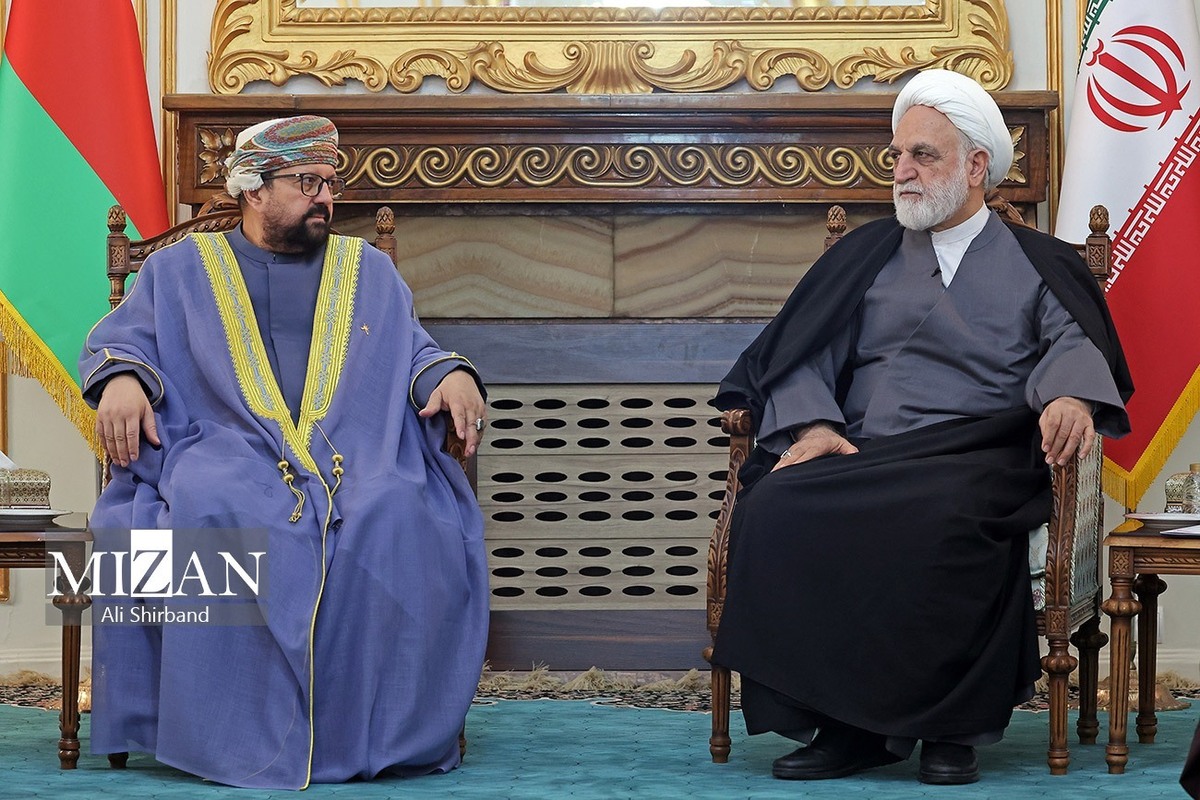In Iran, the law provides for the provision of relief facilities for the benefit of prisoners and convicts

Hojatoleslam Wal Muslimin Mohseni Ejei welcomed and greeted the Chief Justice of the Sultanate of Oman's Supreme Court, who has traveled to the Islamic Republic of Iran with a high judicial delegation. He said: We are deeply grateful to the government of Oman, its people, scholars, and intellectuals for taking a favorable stance in condemning the Zionist regime's sevenfold crimes against the Palestinian people. These admirable actions of the Omani people will undoubtedly live on in history.
The head of the judiciary of the Islamic Republic of Iran stated: Today, there is a heavy duty on the shoulders of the scholars of Islamic countries and the judicial systems and justice systems of Islamic countries to condemn and pursue the crimes of the Zionists in Gaza, Lebanon and Syria; the Zionists, as a result of the comprehensive support of some Western countries, have martyred about 50 thousand Palestinians, men, women, elderly and young, for more than a year, and have not even shown mercy to sick children, and have also attacked hospitals, schools and shelters in Gaza. In Lebanon, everyone has also seen the effects of the Zionists' crimes; now in Syria, the Zionist regime is abusing the created vacuum and committing crimes and violating the territorial integrity of this country. Syria is an Islamic country, and the Zionists are now destroying all the defense and strategic infrastructure of this Islamic country. We have no hope in the so-called international forums to stop the Zionist killing machine and aggression, but we must know that if we do not unite and stand against such crimes, we will have no answer in this world and in the Hereafter before God.
The head of the judiciary continued to consider the relations between Iran and Oman as long-standing, friendly, and extensive in various fields, and emphasized the development and expansion of judicial and legal exchanges and relations between these two neighboring and friendly countries.
The head of the judiciary said: Iran and Oman should share their experiences and accomplishments in the field of legal and judicial issues. This sharing can be taken into consideration, particularly in areas like the use of new technologies, electronic proceedings, and artificial intelligence to speed up and facilitate judicial investigations and provide services to the public.
The Chief Justice continued by emphasizing the commonality of the judicial foundations of the two countries of Iran and Oman and their reliance on the teachings of the manifest religion of Islam, as well as the similarities of the judicial structures of the two countries, and said: In the Islamic Republic of Iran, based on Islamic teachings, important leniency facilities have been foreseen and incorporated in the law for the benefit of eligible prisoners and convicts; among these cases is the prescription of electronic monitoring for eligible prisoners, so that they can serve the rest of their sentence under certain conditions outside the prison; one of the advantages of this, in addition to reducing costs, is that we better understand whether the convicted and convicted person has reformed or not? Also, when such a person is placed in a social environment and avoids repeating the crime, the ground is created for him to benefit from amnesty or other leniency stipulated in the law and his sentence period ends. In general, the main goal in our prison structure is to reform the convicted person and re-socialize him.
Hojatoleslam Wal Muslimin Mohseni Ejei stated: we also offer a variety of educational and training programs in prisons to help reintegrate and reform inmates. We even give them training and job opportunities. Additionally, one of the requirements for inmates to be eligible for legal concessions is that they behave well within the prison and be certain of their punishment.
The head of the judiciary said: One of our fixed agendas in the prison system is to support the families of inmates, and we have put mechanisms in place to do so. Our objective is for a person's convictions to prevent his family from experiencing various forms of distress, particularly when it comes to managing their lives, particularly if that person is the head of the household.
During this meeting, the Chief Justice of the Supreme Court of Oman, while expressing his deep appreciation for the warm welcome and hosting of the Islamic Republic of Iran by the Supreme Judicial Council of Oman, stated: "We believe that the Islamic Republic of Iran is taking the right path due to its positive stances towards events in the Islamic world, and for this reason, we are grateful to the Islamic Republic of Iran and ask God to protect all Islamic countries."
This Omani judicial official, while providing explanations regarding the implementation of legal leniency for convicts in this country, said: "The leniency facilities for convicts in Iran have attracted our attention; especially the prescription of electronic restraints for eligible convicts in Iran, which can be very beneficial and beneficial; In a meeting we had with the Head of the Center for Statistics and Information Technology of the Judiciary of the Islamic Republic, he provided us with detailed explanations in this area and other areas related to new technologies in judicial proceedings in Iran, and we became familiar with this sector."